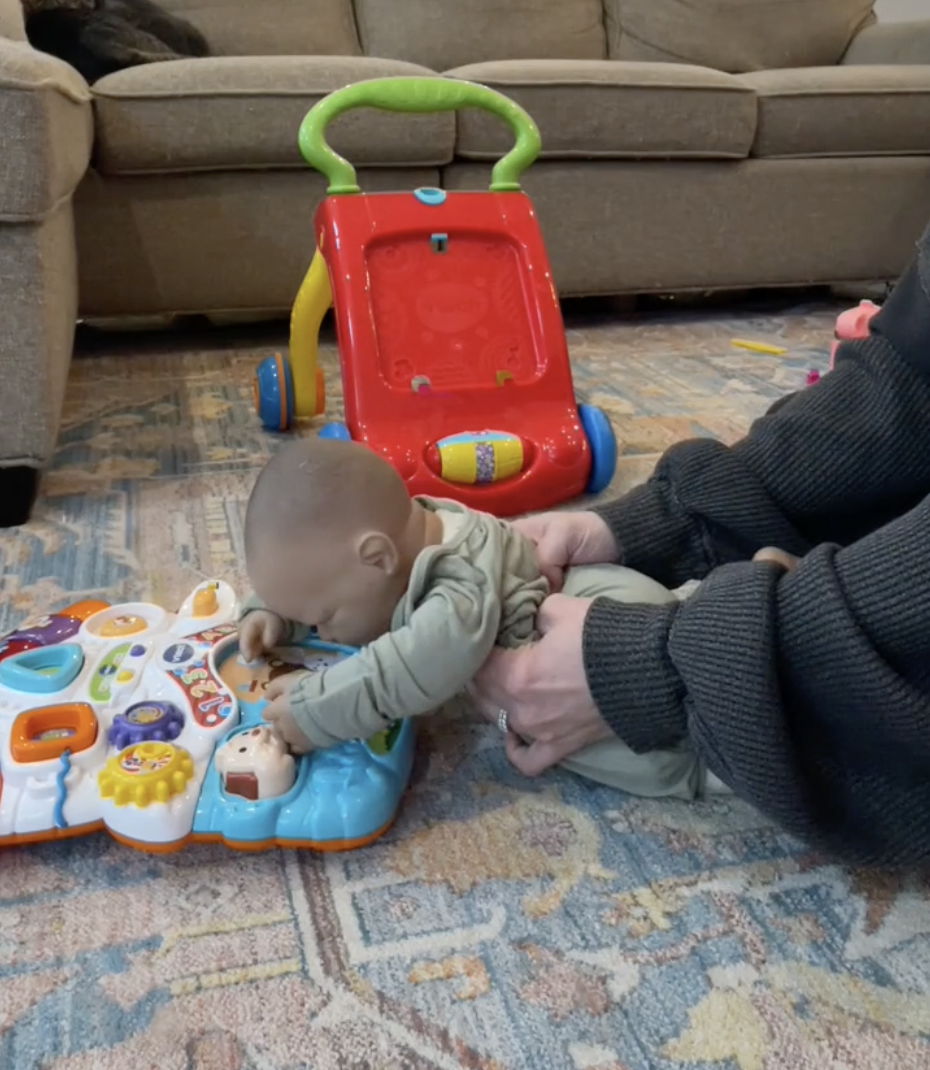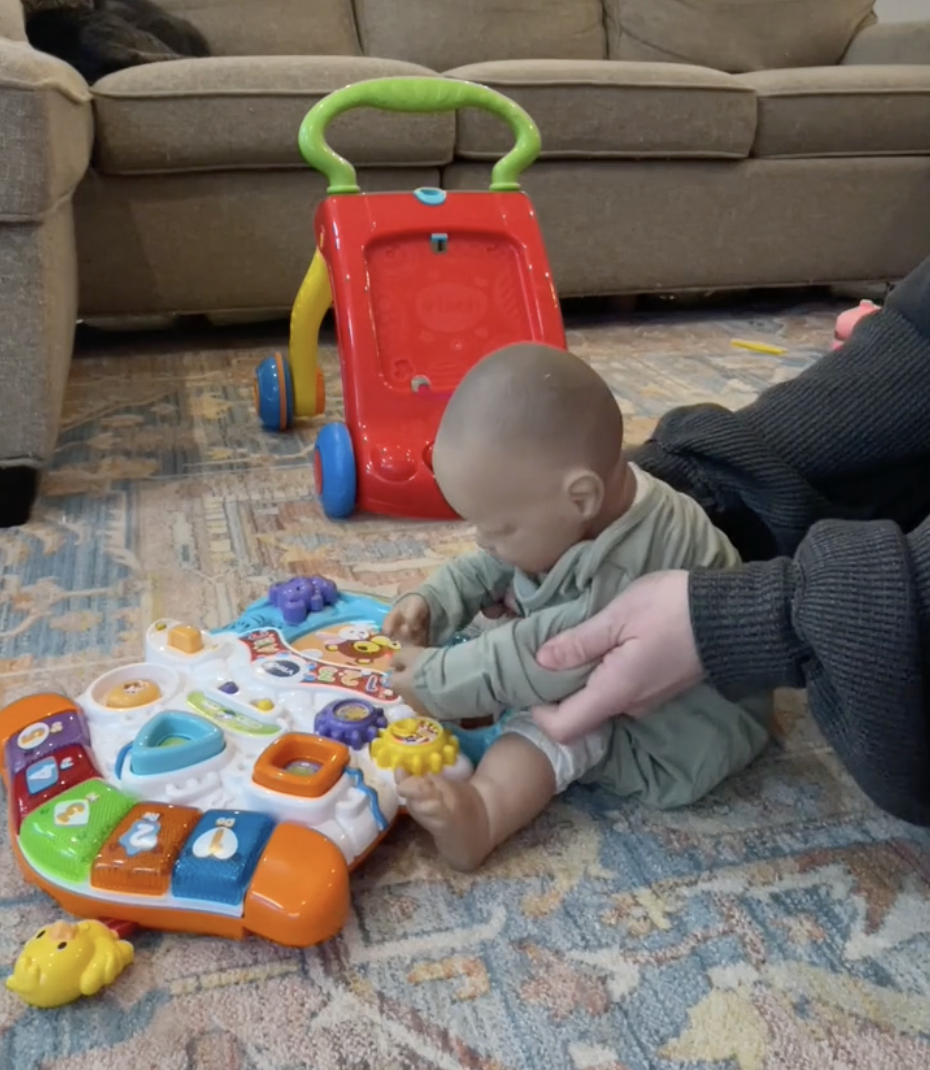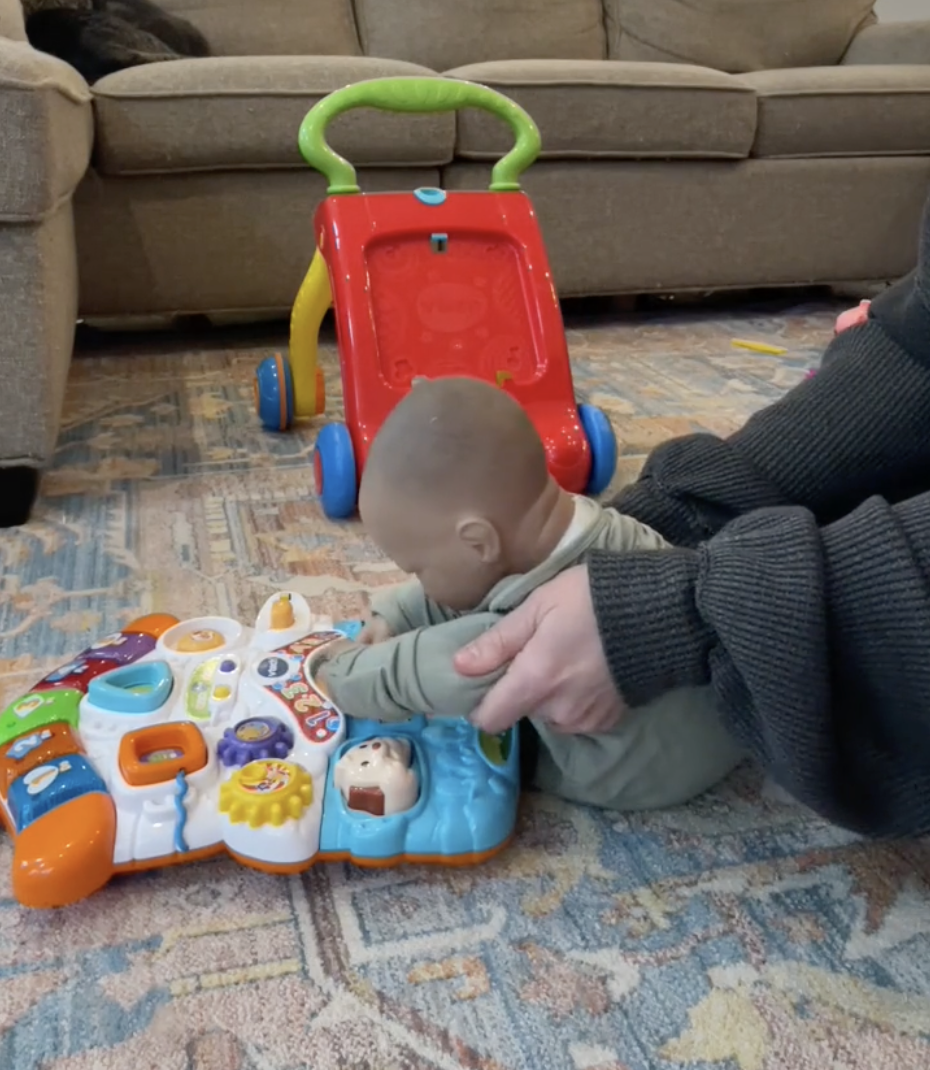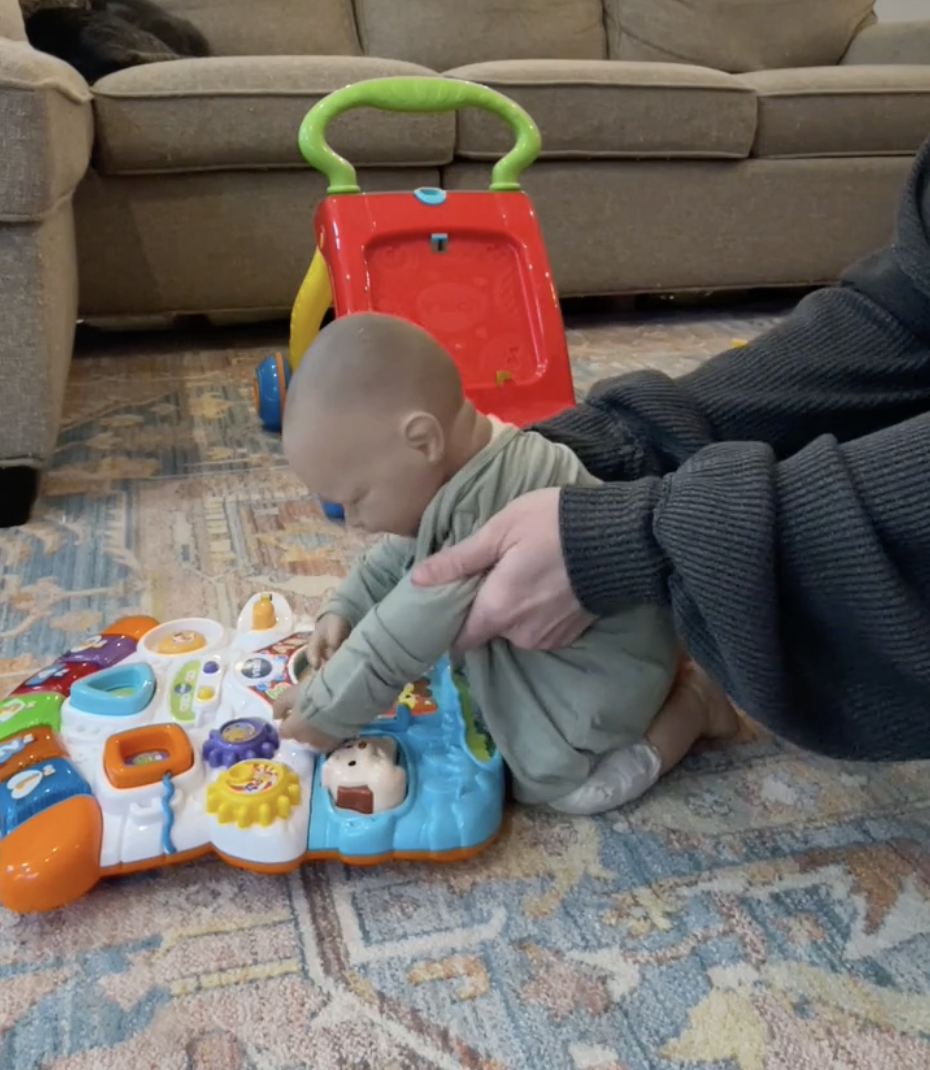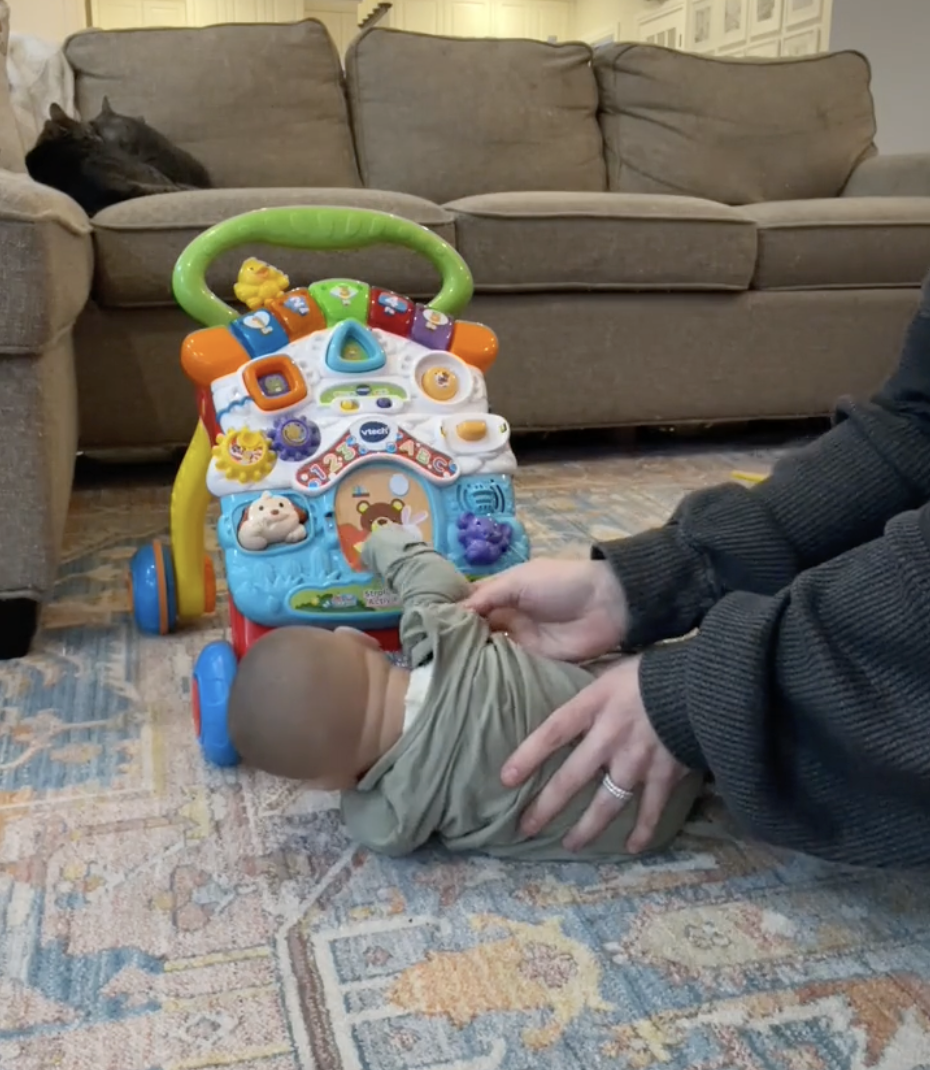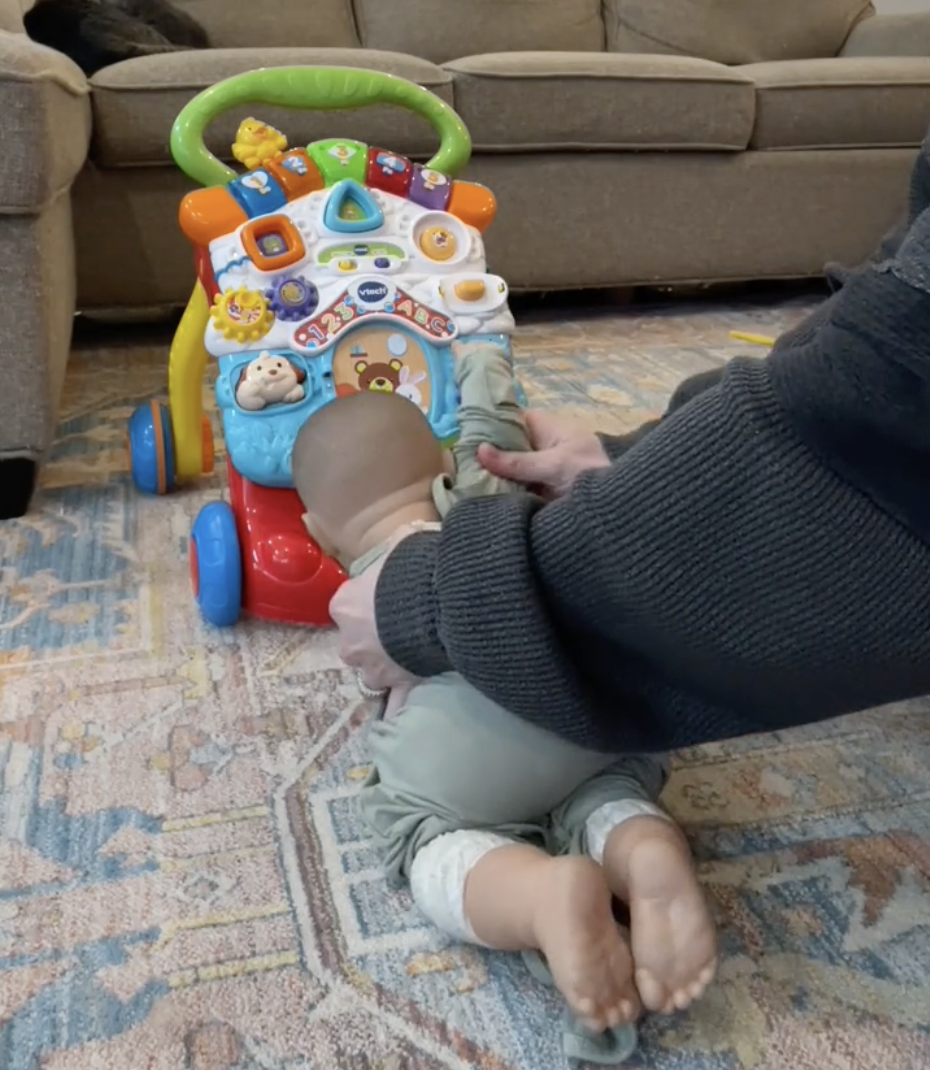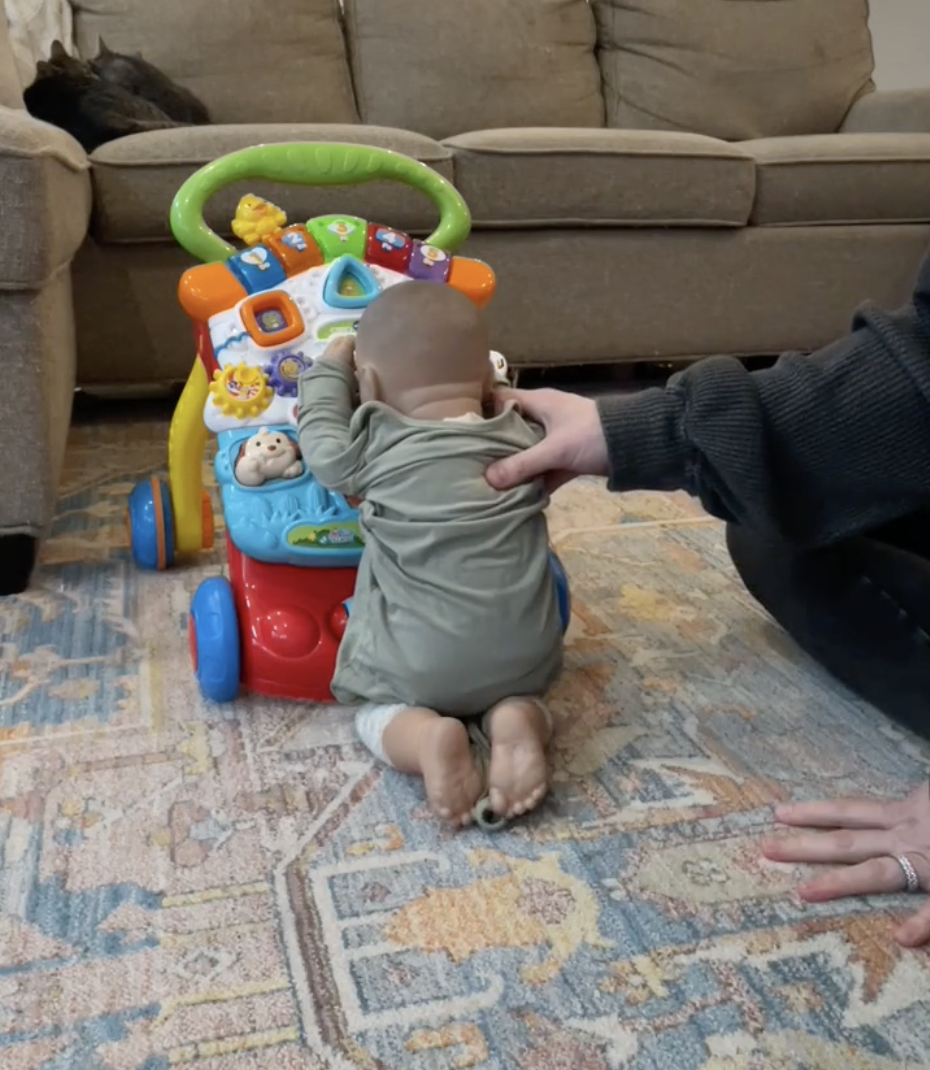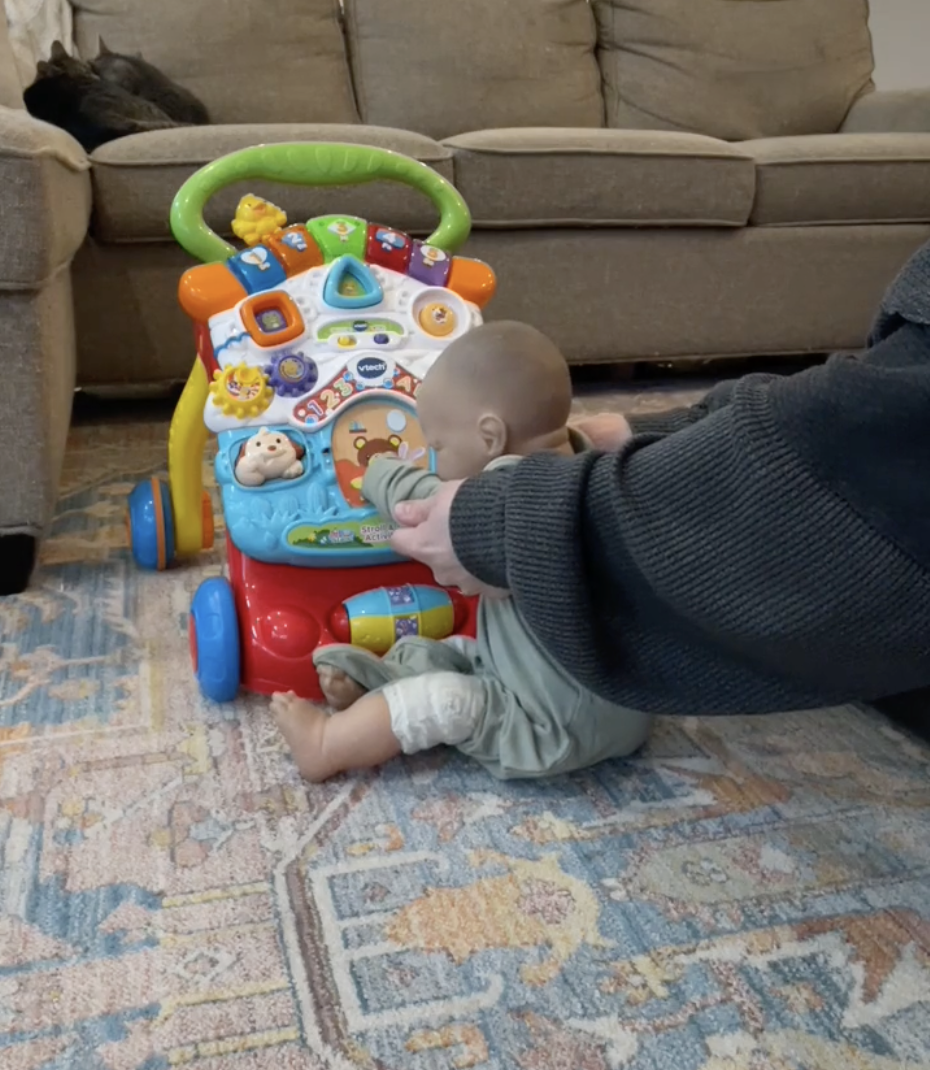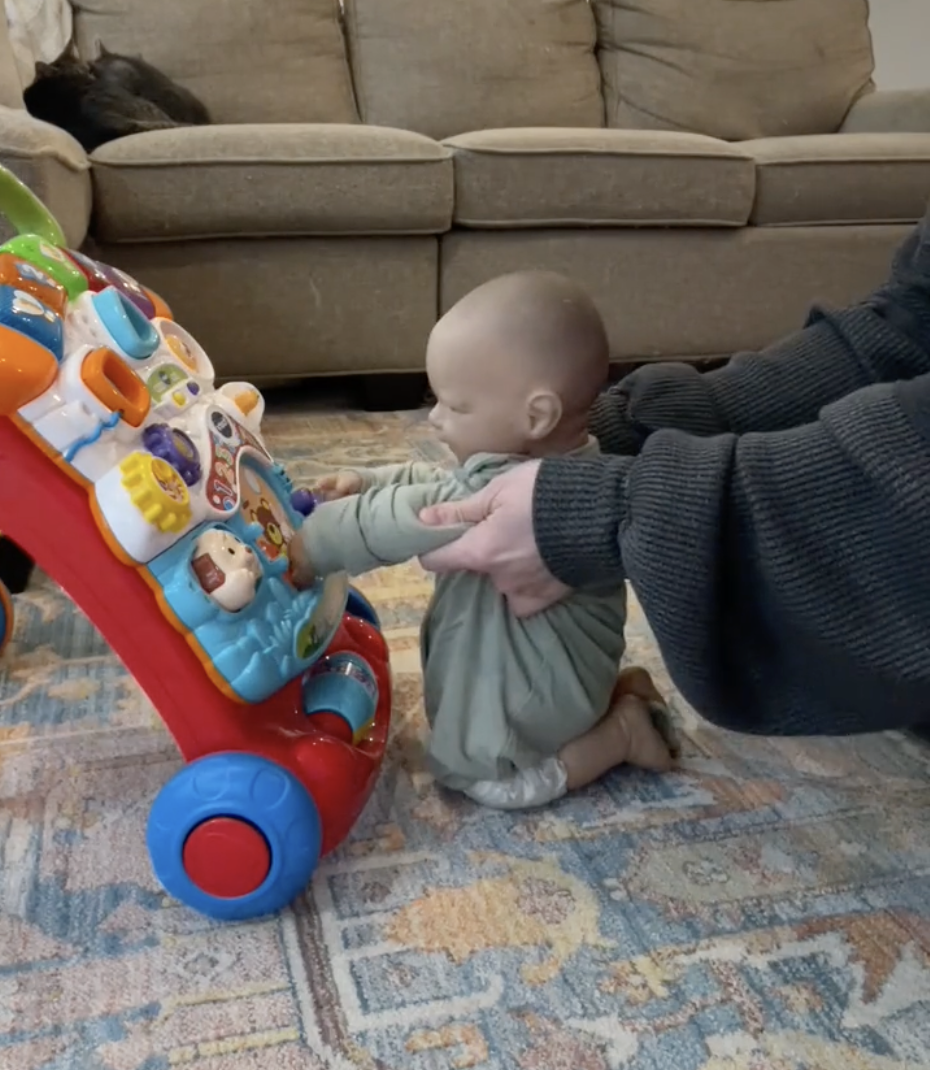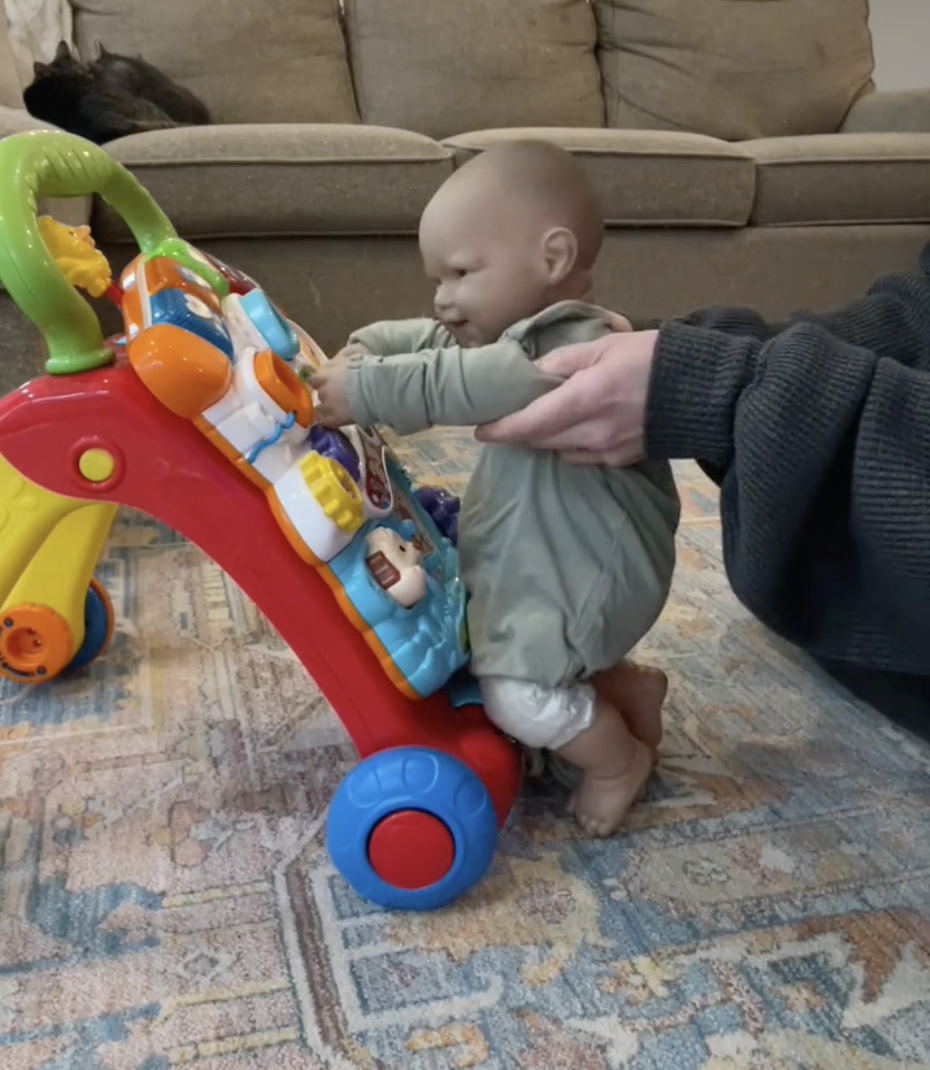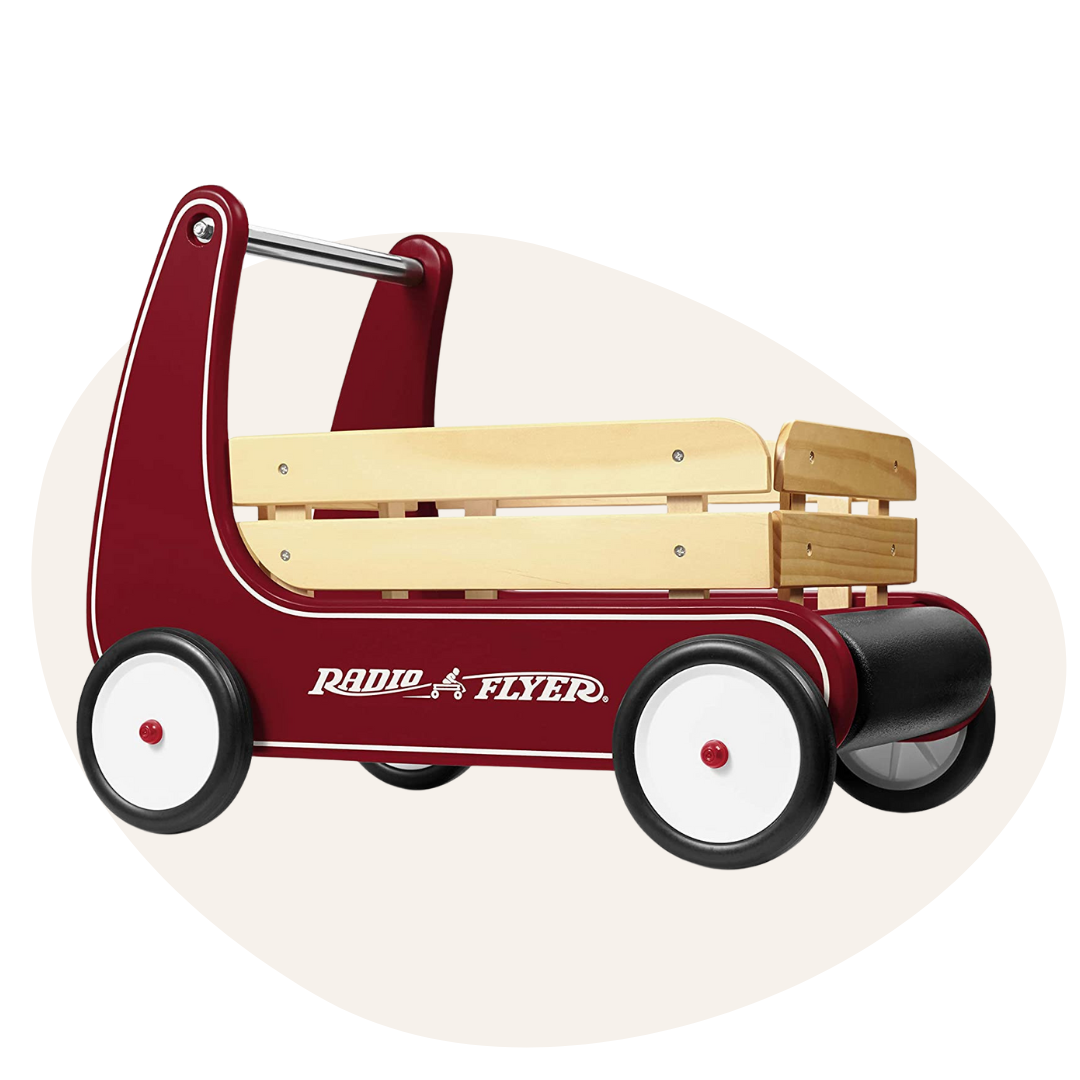Push Walkers: Does Your Baby Need One?
What is a Push Walker?
Before starting, it is important to note that there is a vast difference between sit in walkers and push walkers. Sit in walkers are generally NOT recommended and are actually banned in most places except the United States due to safety reasons.
In comparison, a push walker is anything that a child can use to actively bring themselves from the floor to a standing position and then push forward to take steps. With a push walker, your child is standing, not sitting, and not confined to the device.
An important note before we go on- a push walker can be a great option for babies who want to explore upright with support, but they are absolutely NOT a necessity for your child’s development towards independent walking! In fact, I can almost guarantee that if you don’t purchase a push walker, as your child moves towards walking independently, they’ll use just about anything they can as a stand in “push walker”, like a laundry basket, diaper box, chair, or a stool!
One last note before moving on - if your little one is exploring upright anywhere from pulling to stand up through taking a few steps, and you're looking for lots of tips, tricks, environment set ups & ways to play purposefully that work towards independent walking, don't forget to check out my walking masterclass, linked here!
Let’s dig into all things pushwalkers, starting with some pros & cons:
Pros of Push Walkers
Push walkers can have a lot of great benefits for your child’s development, and for some kiddos, can be a huge help in gaining the confidence to explore upright skills more independently. They can also be used both before and after walking skills are developed depending on the style of the push walker and the child’s preference, making some styles (like shown above) a great option for play time for more than just pre-walkers! Some styles of push walker can be used for everything from encouraging tummy time, through sitting practice, hands and knees play, pulling to stand, step taking and squatting to/from floor, as shown in the above photos. They can also be helpful for supporting balance when your child is progressing through & motor planning upright skills AND help with confidence in standing for some children.
Cons of Push Walkers
Some of the most frequently asked questions I receive are related to children reaching for or wanting support before they’ll attempt exploring step taking. Unfortunately, for some children, push walkers can feed into that desire for support and children may become reliant on using them and/or resistant to attempting steps without it. In those cases, my suggestion would be putting the push walker out of sight for a few days and noting if any changes happen - it may be tough for the first few days, but often times once it’s out of sight, out of mind, they’ll start to build back the confidence to explore without it!
Depending on the push walker used, it is also helpful to be aware that it may move too quickly on surfaces, resulting in children rising onto toes or leaning far forward to keep hands in contact with it. If that is the case for your little one, using a weight strapped to the bottom front can often be helpful in slowing it down & allowing them to have more control.
Lastly on this note….
Overall, push walkers are great for some kids and I do use them for my own children and in therapy sessions. They are not a “must have” and if you ARE going to use one, my biggest tip is to LET YOUR BABY LEAD! When possible, avoiding placing them in standing at the push walker, allowing them to initiate moving it rather than moving it for them, and overall letting them explore if and how they want to use it can be really helpful! And again, if you have already introduced one & it seems like they are becoming reliant on it, or won’t attempt the same skills without it - don’t hesitate to try putting it out of sight for a few days and see what happens!
So you’ve decided you want a push walker, but which one should you get?
There are a ton of different push walkers on the market, some of which serve different purposes than others - but overall, here are my top two I’ve found work best for *most* babies!
VTech Sit-To-Stand Learning Walker
This push walker is my recommendation for a plastic option. The front pops off it usable from birth (yay tummy time!) right up through walking & beyond. Things like tummy time, sitting, hands and knees play, all the way through to taking steps (check out my reel on Instagram for a visual!) can be accomplished AND it has adjustable resistance on the wheels, which can be really helpful if it’s moving too quickly for your little one.
TIP: As I mentioned above, push walkers can topple over when they’re pulling to stand, or move too quickly for them to keep up with, especially on certain floor surfaces (ie: carpet vs. tile or wood). If you’re noticing either of those, giving a little weight to the front of the push walker can make a huge difference! For a visual of how to do this, check out my reel on Instagram here.
Wooden Push Walker:
There are tons of wooden options, but I personally love this one! It’s pricier than the plastic ones, but it’s great because they can use it WAY past the push walker stage into toddlerhood as a wagon. Because of that wagon design, it’s also easy to give it a little weight by adding items to the front, which can be extremely helpful for encouraging safe exploration of it’s use!
And while those two are my favorite plastic vs. wood options, there are LOTS of other good ones! Check out this list for some more I’ve personally used & found to be good options.
Baby Walker Frequently Asked Questions:
What is the proper foot alignment during push walker use?
If alignment as described above is only on one side and there is any indication of pain/discomfort/limp, any history of hip concerns, or the alignment doesn’t improve over a few months as they become more proficient independent walkers, it’s absolutely worth mentioning to your pediatrician to be sure further assessment isn’t’ warranted.
When should I introduce the push walker to my baby?
IF you’re waiting until closer to the pre-walking stage, I usually recommend just leaving the push walker within their play space if it’s safe to do so, giving them the opportunity to explore using it on their own as they play! Again, as mentioned earlier, letting your child lead is definitely the goal when it comes to push walkers!
And again, if your little one is exploring upright anywhere from pulling to stand up through taking a few steps, and you're looking for lots of tips, tricks, environment setups and ways to play purposefully that work towards independent walking WITHOUT using a pushwalker, don't forget to check out my walking masterclass, linked here!
How do I know if my child is relying on a push walker too much?
Again, while I find push walkers can be a really great option for helping support stability and confidence in upright exploration and pre-walking skills, some children definitely can get a bit reliant on them for support and may be unwilling to explore without them, which is when I usually say to consider just putting it out of sight for a bit! The biggest indicators that a child may be relying on it too much would be a stall in progress of their upright skills and/or them NOT being willing to explore upright WITHOUT it or without other supports (like your hands). What I mean about progress in upright skills is that generally speaking, we want to see a child moving “forward” with skills, aka making progress - even if that progress is ‘slow and steady’.
So from pulling to stand, we expect them progressing to cruising with hand support, beginning to explore letting go with one or both hands, etc. If you’re noticing they’ve been a little bit stagnant with those skills moving forward, it would be worth just trialing putting it out of sight and see what happens! Hope that helps!
Looking for Milestone Support?
For developmental questions, tips and guidance related to milestones about tummy time, rolling & sitting, crawling and walking, check out KC’s developmental Masterclasses linked here.
Was this helpful? Save it for later!



